| |
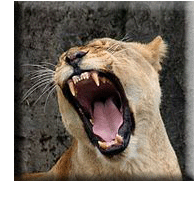 Prophet and Messiah:
Prophet and Messiah:
Garlic in a Lion's Tooth
We are often asked, what is the purpose of the codes? Why do they exist? Our view is that God created codes in the Bible because He cares about us and wants to show us another facet of His omniscience and creativity.
We decided to do a series of searches for True Prophet and True Messiah. The results were not only significant in number and length (23 codes ranging from 11 to 54 letters in length), but in several cases they were remarkably moving and poetic. For example, the following is a code that was found while searching for the phrase True Prophet.
Photo of lioness from Wikipedia.
True Prophet (4)
A true prophet kills complacency.
His sign is garlic in a lion's tooth.
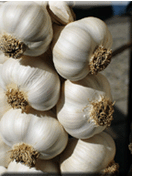 In this 25-letter-long code, the first sentence a true prophet kills complacency is the ultimate description of a prophet's role: to speak the truth leaving the hearer no option to be complacent, but faced with making a moral choice. In this 25-letter-long code, the first sentence a true prophet kills complacency is the ultimate description of a prophet's role: to speak the truth leaving the hearer no option to be complacent, but faced with making a moral choice.
The second sentence, his sign is garlic in a lion's tooth, is pure poetry. The strong, pungent flavor of garlic combined with the power symbolized by a lion's tooth emphasizes the influence and power of the true prophet's speech.
Along with its obvious culinary uses, garlic has long been used for medicinal purposes. This adds another layer of symbolism to this code. A prophet's words are also medicinal for directing the hearer back to a "healthier" path.
Besides being a symbol of power and strength, here are some other instances of symbolism regarding a lion:
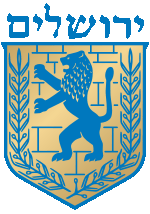
- It is the emblem of the City of Jerusalem, flanked by olive branches. Emblem from Wikipedia.
- In Genesis 49:9, Jacob called Judah a lion's cub, "You are a lion's cub, O Judah; you return from the prey, my son. Like a lion he crouches and lies down, like a lioness—who dares to rouse him?" (NIV)
- In Hosea 5:14, God's judgment is spoken through Hosea to Judah, "For I will be like a lion to Ephraim, like a great lion to Judah. I will tear them to pieces and go away; I will carry them off, with no one to rescue them." (NIV)
- In Revelation 5:5-7, Jesus is both Lion and Lamb:
Then one of the elders said to me, "Do not weep! See, the Lion of the tribe of Judah, the Root of David, has triumphed. He is able to open the scroll and its seven seals."
Then I saw a Lamb, looking as if it had been slain, standing in the center of the throne, encircled by the four living creatures and the elders. He had seven horns and seven eyes, which are the seven spirits of God sent out into all the earth. He came and took the scroll from the right hand of him who sat on the throne. (NIV)
Finding a code like this that combines mathematical beauty, in the form of statistical significance, with pure poetry, spurs us on in our research.
Prophet, Messiah, God and Jesus
The codes presented in this article fall into two sections. Below each heading are listed the terms searched for.
- True Prophet
- True Prophet
- Jesus True Prophet
- True Messiah
- True Messiah
- The True Messiah
- Jesus True Messiah
True Prophet
True Prophet
We examined the 20 shortest skips in the Tanakh (Old Testament) for the term True Prophet. Eleven of the 20 resulted in extended codes ranging from 11 to 54 letters long. We already commented on True Prophet (4) above. Here are the remaining 10 codes.
True Prophet (1)
They left. They stayed. They cried.
Will they starve due to a true prophet
who finds fault in them?
This code reminds us of the prophet Jonah. At first, he resisted God's call, but then he went to Nineveh to pronounce God's judgment on it. The people repented and God relented from the disaster he had planned for them. Jonah became angry, but God was kind and merciful.
True Prophet (2)
A true prophet is breathing.
Prophets are known for being called upon by God to speak. Perhaps the word breathing in this code refers to their speech, or it may relate to God's breath of life. "And the LORD God formed man of the dust of the ground, and breathed into his nostrils the breath of life; and man became a living being." (Genesis 2:7, NKJV) Lastly, it may refer to Scripture being God-breathed, "All Scripture is God-breathed . . ." (2 Timothy 3:16a, NIV)
True Prophet (3)
God has become irrelevant to them.
We will hate the one who is a true prophet to me.
God has become irrelevant to them sounds like the German philosopher, Frederick Nietzsche (1844-1900), when he wrote, "Gods too decompose. God is dead. God remains dead. And we have killed him." (ThinkExist.com) It is not a stretch to imagine a philosopher with a similar mindset writing the rest of this code: We will hate the one who is a true prophet to me.
True Prophet (6)
Where is God for the true prophet in them?
The measure is full.
This code brings to mind a quote from the Gettysburg Address. In it, Abraham Lincoln used the phrase, "the last full measure of devotion" when describing the soldiers that gave their lives.
Here is an excerpt from the Address:
It is rather for us to be here dedicated to the great task remaining before us—that from these honored dead we take increased devotion to that cause for which they gave the last full measure of devotion—that we here highly resolve that these dead shall not have died in vain—that this nation, under God, shall have a new birth of freedom—and that government of the people, by the people, for the people, shall not perish from the earth.
President Abraham Lincoln
November 1863
TheLastFullMeasure.com
Perhaps this code speaks of a similar devotion in the prophet, who gives his entire life to God, even unto death.
True Prophet (8)
Thus, a true prophet is a shining vessel. Be ashamed, my generation.
Have mercy on his light. The falcon has uttered in bitterness.
She is honest, and the father is burning with excitement and rejoices.
In this 53-letter-long code, the phrase, be ashamed, my generation, reminds us of Jesus responding to the Scribes and the Pharisees, who were asking for a sign.
But He answered and said to them, "An evil and adulterous generation seeks after a sign, and no sign will be given to it except the sign of the prophet Jonah. For as Jonah was three days and three nights in the belly of the great fish, so will the Son of Man be three days and three nights in the heart of the earth. The men of Nineveh will rise up in the judgment with this generation and condemn it, because they repented at the preaching of Jonah; and indeed a greater than Jonah is here. The queen of the South will rise up in the judgment with this generation and condemn it, for she came from the ends of the earth to hear the wisdom of Solomon; and indeed a greater than Solomon is here." (Matthew 12:39-42, NKJV)
Again we see the poetry of the codes in the sentence: The falcon has uttered in bitterness. A falcon is a bird of prey. It may be that the bitterness is a result of an unsuccessful attack. This sentence may refer to an unsuccessful attack on the true prophet by an antagonist.
True Prophet (10)
My blood provides protection to the one
who is mocking a true prophet, companion to God.
You will not experience any molester.
This code could be from Jesus' point of view. His blood providing protection to even one who is mocking a true prophet. Companion to God could refer to Jesus or the true prophet. The last sentence could be Jesus' promise of protection.
True Prophet (11)
His failure is like that of a true prophet.
Jacobi notes that this code may be sarcastic in tone. It may echo the comment in John 4:44, "For Jesus Himself testified that a prophet has no honor in his own country." (NKJV)
True Prophet (14)
Where is the boundary of my mountain? God, my emptiness is bitter.
Make (me) poor, and please be uncontrolled at this time.
Where is the true prophet, or the measure of his shovel in Babel?
This code is the longest of this group at 54 letters long. It reads like a Psalm or prayer. We can imagine someone crying out to God,
Where is the boundary of my mountain? Where is my land or inheritance? God, my emptiness is bitter. I am lonely, hurting, miserable to the point of bitterness. Make (me) poor, and please be uncontrolled at this time. Take everything from me and then be generous and merciful. Where is the true prophet, Where is my help, or one to guide me? or the measure of his shovel in Babel? Where is the prophet's ability to make change in an evil place?
True Prophet (16)
Take a true prophet who will get scared with me,
and let them vanish. Go, my words, and let us be terminated.
This code sounds like someone is having an argument with a prophet. The person is accusing the prophet of fear, and telling the prophet to go away and speak no more. Perhaps it is someone in authority, like a King, who does not like what the prophet is saying.
True Prophet (18)
Through them God will weaken his fiery daughter,
and a true prophet will illuminate to the flying.
This code brings up several questions. Who is them? Does the fiery daughter belong to one of them or to God? Does the fiery daughter refer to the church? And a true prophet will illuminate sounds like it is referring to a prophet's exhortation, which should be illuminating. To the flying, unless it is referring to angels, is puzzling and seems like an incomplete thought.
Jesus (Yeshu) True Prophet
In addition to True Prophet, we also ran searches for Jesus True Prophet. Out of three ELS findings, all three resulted in extensions.
First, some background on why we would search for this particular term. On the same day the women found Jesus' tomb empty, two men were traveling on the road to the village of Emmaus when a stranger asked them what they were talking about.
He [Jesus] asked them, "What are you discussing together as you walk along?"
They stood still, their faces downcast. One of them, named Cleopas, asked him, "Are you only a visitor to Jerusalem and do not know the things that have happened there in these days?"
"What things?" he asked.
"About Jesus of Nazareth," they replied. "He was a prophet, powerful in word and deed before God and all the people. The chief priests and our rulers handed him over to be sentenced to death, and they crucified him; but we had hoped that he was the one who was going to redeem Israel. And what is more, it is the third day since all this took place." (Luke 24:17-24, NIV)
After describing him as a prophet, they explain their hopes that he was the messiah ("the one who was going to redeem Israel"). They continue to explain that the women had told them the tomb was empty and that Jesus was alive. It is not until they sit down to eat with Him that they recognize they have been speaking with Jesus. (See Luke 24:13-35.)
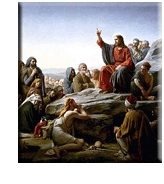 Jesus (Yeshu) True Prophet (1) Jesus (Yeshu) True Prophet (1)
Be God-fearing, for Jesus is a true prophet
for him who is meek.
Be God-fearing could not be more plain-speaking in its language, and for Jesus is a true prophet for him who is meek, calls to mind Matthew 5:5, "Blessed are the meek, for they will inherit the earth." (NIV) The meek in this code could also refer to those that Jesus chose to spent time with: the sinners and tax collectors, who realize how much they need a savior. Artwork courtesy of CarlBloch.org.
While Jesus was having dinner at Matthew's house, many tax collectors and "sinners" came and ate with him and his disciples. When the Pharisees saw this, they asked his disciples, "Why does your teacher eat with tax collectors and 'sinners'?"
On hearing this, Jesus said, "It is not the healthy who need a doctor, but the sick. But go and learn what this means: 'I desire mercy, not sacrifice.' For I have not come to call the righteous, but sinners." (Matthew 9:10-13, NIV)
Jesus (Yeshu) True Prophet (2)
Await the dew of many,
Jesus the true prophet!
The dew in the first part of this code may be an allusion to manna. In Numbers 11:9, "When the dew settled on the camp at night, the manna also came down," (NIV) we find that the manna came down with the dew of the evening.
In John 6:58, the bread from heaven is Jesus,
"This is the bread which came down from heaven—not as your fathers ate the manna, and are dead. He who eats this bread will live forever." (NKJV)
And in Revelation 2, John is commanded to write to the angel of the Church of Pergamos (the compromising church) these words from the Son of Man:
"He who has an ear, let him hear what the Spirit says to the churches. To him who overcomes I will give some of the hidden manna to eat. And I will give him a white stone, and on the stone a new name written which no one knows except him who receives it." (Revelation 12:17, NKJV)
Given these Scripture references, we could paraphrase this code as, await the manna from heaven for many, Jesus the true prophet!
Jesus (Yeshu) True Prophet (3)
Jesus is a true prophet, and he who hurries
will not be destroyed.
OR
Jesus is a true prophet, who will not be destroyed
The first code is found using wrapped text. If we stop prior to wrapping the text, then we have a the second code saying, Jesus is a true prophet, who will not be destroyed.
He who hurries will not be destroyed, reminds us of 2 Corinthians 6:1-2, where Paul admonishes the Corinthians to act now to receive the grace of God.
We then, as workers together with Him also plead with you not to receive the grace of God in vain. For He says: "In an acceptable time I have heard you, And in the day of salvation I have helped you." Behold, now is the accepted time; behold, now is the day of salvation. (NKJV)
We also searched for Jesus (Yeshua) True Prophet. There were no findings for that search term.
True Messiah
True Messiah (3.05)
A permission from every echo of a true messiah,
and the falcon of our blessing is a betrothed convert.
As in True Prophet (8), this code has the word falcon in it. In this case, the word falcon is referring to a betrothed convert. In John 3:27-30, John the Baptist's testimony about Christ is given. In it, he refers to Jesus as the bridegroom.
To this John replied, "A man can receive only what is given him from heaven. You yourselves can testify that I said, 'I am not the Christ but am sent ahead of him.' The bride belongs to the bridegroom. The friend who attends the bridegroom waits and listens for him, and is full of joy when he hears the bridegroom's voice. That joy is mine, and it is now complete. He must become greater; I must become less." (NIV)
The bride or betrothed convert would then be a believer, or the body of believers (the church). Instead of being the bitter or disappointed attacker of the True Prophet (8) code, in this code the falcon is described as a blessing, and the word may be used to describe the convert as being effective or helpful in some way.
True Messiah (4.06)
Do not touch the true messiah,
while the thief is napping.
While the thief is napping brings to mind several different Scriptures. In Matthew 24:36-44, it says the owner of a house would wait up for the thief if he knew when he was coming. Here Jesus is speaking of the coming of the Son of Man. In Luke 12:33-34, Jesus teaches his disciples the benefit of selling their belongings and giving to the poor, saying it would be a treasure in Heaven, "where no thief comes near and no moth destroys." (NIV) In 1 Thessalonians 5:2-4, and 2 Peter 3:10 speaks of the Day of the Lord coming like a thief in the night. In Revelation 3:1-3, the angel of the church of Sardis says that "He who has the seven Spirits of God and the seven stars . . . will come upon you as a thief . . ." (NIV) and in Revelation 16:15, Jesus is quoted, "Behold, I come like a thief! Blessed is he who stays awake and keeps his clothes with him, so that he may not go naked and be shamefully exposed." (NIV)
If we base the meaning of the code on the Scriptures in Revelation, do not touch the true messiah, while the thief is napping could mean that Jesus is absent physically (He has ascended), but that He will return.
True Messiah (5.07)
A true messiah crushed in them what is in them,
and has nourished some defect.
Several Scriptures come to mind that speak of being crushed:
The LORD is close to the brokenhearted and saves those who are crushed in spirit. (Psalm 34:18, NIV)
"Everyone who falls on that stone will be broken to pieces, but he on whom it falls will be crushed." (Luke 20:18, NIV)
But he was pierced for our transgressions,
he was crushed for our iniquities;
the punishment that brought us peace was upon him,
and by his wounds we are healed. (Isaiah 53:5, NIV)
Taking these Scriptures in mind, the code may refer to the messiah crushing the power of sin and death. Nourished some defect may describe Christ's nail-pierced hands and feet.
When you were dead in your sins and in the uncircumcision of your sinful nature, God made you alive with Christ. He forgave us all our sins, having canceled the written code, with its regulations, that was against us and that stood opposed to us; he took it away, nailing it to the cross. And having disarmed the powers and authorities, he made a public spectacle of them, triumphing over them by the cross. (Colossians 2:13-15, NIV)
Another meaning for the defect could be the "foolishness" of the cross and God's Wisdom to the unbeliever.
For the message of the cross is foolishness to those who are perishing, but to us who are being saved it is the power of God. (1 Corinthians 1:18, NIV)
For the foolishness of God is wiser than man's wisdom, and the weakness of God is stronger than man's strength. (1 Corinthians 1:25, NIV)
But God chose the foolish things of the world to shame the wise; God chose the weak things of the world to shame the strong. (1 Corinthians 1:27, NIV)
True Messiah (9.13)
The meek are desolate in creation,
and a winemaker will turn toward you.
From among you will emerge a true messiah.
The first thing we are struck by in this code is the reference to the meek.
Blessed are the meek, for they will inherit the earth. (Matthew 5:5, NIV)
And then the reference to a winemaker. Jesus could be called the winemaker, because He turned water into wine in John 2:1-11.
Looked at as a whole, this code could be referring to Jesus teaching the meek, turning water into wine, and emerging as the true messiah.
True Messiah (11.16)
Drink and be festive in his community.
Watch, the true messiah is dormant in my heart core.
What is it that he even ascended? That is quite sufficient for us.
Drink and be festive in his community may refer to the passage in Matthew where Jesus talks about the friends of the bridegroom:
And Jesus said to them, "Can the friends of the bridegroom mourn as long as the bridegroom is with them? But the days will come when the bridegroom will be taken away from them, and then they will fast." (Matthew 9:15, NKJV)
The remainder of the code could be pointing to Jesus and to His ascension.
No one has ascended to heaven but He who came down from heaven, that is, the Son of Man who is in heaven. (John 3:13, NKJV)
True Messiah (14.20)
Babylon is in him,
the son of the true messiah.
Your daughter.
Babylon is the ancient city known for its temples, palaces, and famous hanging gardens, one of the seven wonders of the world. Its location is in modern-day Iraq.
In the Bible, it is the location of the Tower of Babel and the dominion of King Nebuchadnezzar, who sent Shadrach, Meshach, and Abed-Nego into the fiery furnace.
If the code is referring to the idea of the Tower of Babel, it may mean that all language or understanding is in him, the son of a true messiah. It is unclear who the daughter is.
To read more about Babylon, visit AtlasTours.net and/or Wikipedia.
True Messiah (17.24)
Provide me, mother of a true messiah.
This code could be a prayer to Mary, Jesus' mother. Praying to Mary is a custom in Catholicism.
True Messiah (19.26)
The force within me is his.
The true messiah in your midst
is whole and innocent.
The phrase the force within me may be speaking of the Holy Spirit.
"But you shall receive power when the Holy Spirit has come upon you; and you shall be witnesses to Me in Jerusalem, and in all Judea and Samaria, and to the end of the earth." (Acts 1:8, NKJV)
The true messiah in your midst is whole and innocent may refer to Pontius Pilate's wife calling Jesus a "just" (NKJV) and "innocent" (NIV) man, and Pilate "washing his hands" of any culpability for his crucifixion. (Matthew 27:15-26, NKJV, NIV)
The True Messiah
We also looked for The True Messiah as well. One of the two ELSs resulted in extensions.
The True Messiah (2)
The true messiah,
for whom is his fire?
Fire in this code could be literal fire or symbolic. References to fire in Scripture are numerous.
In the Tanakh (Old Testament), it could be the brimstone and fire sent down upon Sodom and Gomorrah (Genesis 19:24), the fire Abraham carried in his hand as he climbed the mountain with Isaac preparing to sacrifice him (Genesis 22:6), the Angel of the Lord appearing as a burning bush to Moses and God calling from the midst of the bush (Exodus 3:2-4), or the fire of the pillar that led the Children of Israel's way in the desert at night (Exodus 13:21).
In the New Testament, we find fire as the instrument of God's "vengeance on those who do not know God, and on those who do not obey the gospel of our Lord Jesus Christ." (2 Thessalonians 1:8b) In 1 Peter 1:7, faith is tested by fire (trials), and in Revelation, we find a description of the risen Christ "with eyes like a flame of fire." (Revelation 1:14b)
We also searched for Jesus (Yeshu) True Messiah and Jesus (Yeshua) True Messiah. There were no findings for these two search terms.
Concluding Remarks
From garlic in a lion's tooth to the meek are desolate in creation, and a winemaker will turn toward you this collection of 23 codes is an impressive group of codes ranging from 11 to 54 letters in length. They are sometimes plain and direct in their language, and other times they are full of symbolism that often echoes Scripture.
Scripture References
Scripture quotations marked "NKJV"TM are taken from the New King James Version®. Copyright ©1982 by Thomas Nelson, Inc. Used by permission. All rights reserved.
Scripture quotations marked "NIV" are taken from the HOLY BIBLE, NEW INTERNATIONAL VERSION®. NIV® Copyright ©1973, 1978, 1984 by International Bible Society. Used by permission of Zondervan. All rights reserved.
Continue to Prophet and Messiah: Tables
|
Enjoy finding your own Bible codes.
Bible code search software is available in our online store.
Subscribe Free! Sign Up Today!
Become a member of the non-profit Isaac Newton Bible Code Research Society.
Not only will you be part of the world's leading organization researching and publicizing Bible and Torah codes, but you will receive Bible Code Digest absolutely free, including . . .
- Latest Bible Code News
- Easy-to-Understand Bible Code Feature Articles
- Exciting Inside Information from Leading Code Researchers
- Details of Great New Discoveries
- Summaries of the Latest Battles Between Code Proponents and Skeptics
Stay current on Bible code news. Be first to hear about all of the latest Bible code discoveries.
Sign up to receive Bible Code Digest today.
|
|


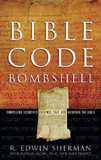 
Bombshell examines two massive, recently discovered clusters of codes in the Hebrew Old Testament. To read more about Bombshell, click here, or click below to order from Amazon today!
 
|







